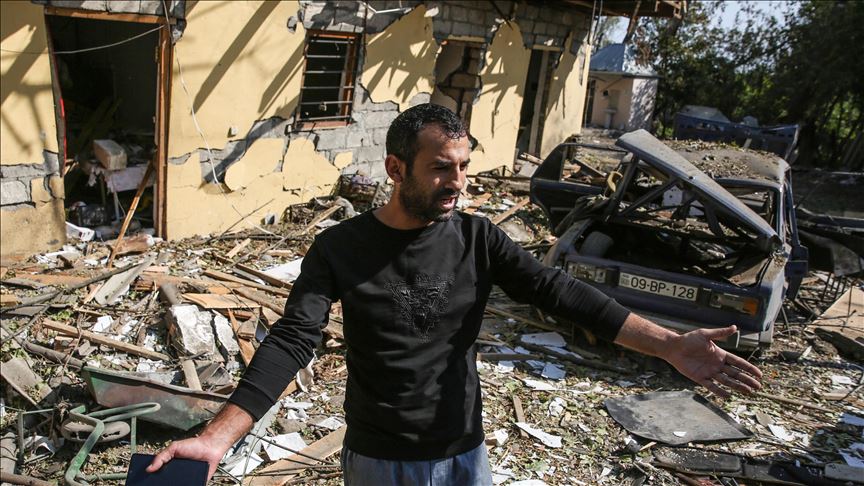Armenian forces continue shelling Azerbaijani villages
Armenian Armed Forces target Azerbaijani civilians, residential areas, leading to casualties, say Azerbaijan authorities
 A man inspects the damage after missiles, allegedly launched by Armenian forces from Nagorno-Karabakh, hit one restaurant and some houses amid the border clashes between Azerbaijan and Armenia on October 08, 2020 in Barda, Azerbaijan. 6 people were reported injured after missiles landed in the garden of a restaurant. ( Onur Çoban - Anadolu Agency )
A man inspects the damage after missiles, allegedly launched by Armenian forces from Nagorno-Karabakh, hit one restaurant and some houses amid the border clashes between Azerbaijan and Armenia on October 08, 2020 in Barda, Azerbaijan. 6 people were reported injured after missiles landed in the garden of a restaurant. ( Onur Çoban - Anadolu Agency )
ANKARA
The Armenian Armed Forces on Thursday continued shelling the Azerbaijani civilian settlements, according to Azerbaijan's Defense Ministry.
Since the morning hours, the Armenian forces shelled the villages of Goranboy, Terter, Aghdam, Barda, and Aghjabedi regions, leading to casualties, said a written statement.
The Azerbaijani army is taking "adequate action" against attacks, it added.
The ministry separately shared the footage of armored vehicles, mainly tanks, left by Armenian servicemen while fleeing Horadiz, a village in the Fuzuli region liberated from the Armenian occupation.
It also published drone footage of artillery strikes inflicted during night battles on the headquarters, infrastructure, weapons, and ammunition depots of the military unit of Armenia.
"Armenian armed forces’ bombardment of our cities and villages using ballistic missiles amount to a war crime. Armenia’s leadership must be held accountable for that," Azerbaijani President Ilham Aliyev said on Twitter.
At least six civilians have been injured -- including two seriously wounded -- when the Armenian army hit a restaurant and two houses in the city of Barda in Azerbaijan.
Meanwhile, as a result of the artillery fire by the Armenian forces of Armenia, an Azerbaijani civilian lost his life in Goranboy province.
The number of Azerbaijani civilians martyred in Armenian attacks rose to 31, according to local officials.
Supply of Azerbaijani army
The supplies of Azerbaijan's military personnel participating in the counter-offensive operations are immediately provided under the instruction of the country's president, the statement said.
"The supply of our troops is carried out in a planned manner by the relevant departments, services, and structures. The military personnel participating in the battles are continuously provided with food, military uniform, household items, and necessary properties, ammunition, military and combat equipment as well as with fuel 24 hours a day."
The Defense Ministry also said that there were no problems with the supply of combat operations.
All tasks related to supply and equipment were carried out in a timely manner, it added.
Attacks on Azerbaijan
Hikmet Hajiyev, the assistant to the president and foreign policy chief for the Azerbaijani Presidency, said on Twitter that Armenia's kamikaze drone was "successfully destroyed" by Azerbaijan's air defense forces, adding that the drone was "whirling around civilian area."
"More civilian lives saved. Armenia's state terror continues. Peace enforcement must continue to stop Armenia," he said.
Hajiyev reiterated that Armenia's "deliberate and indiscriminate attacks" with Smerch missiles and heavy artillery against Azerbaijani cities -- including Ganja, Barda, Tartar and other cities -- and civilians continue.
He also shared footage of destruction with precision guided missile of Grad missile launcher of Armenia which attacked Azerbaijani cities of Barda and Tartar, as well as civilians.
"Lives of many innocent civilians were saved and potential damage to civil infrastructure was prevented."
On Twitter, Hajiyev shared a news report from Russia-based Novaya Gazeta newspaper and said the report proves that French nationals of Armenian origin are fighting in the ranks of Armenia's forces "as mercenaries are attacking Azerbaijani civilians/militaries."
"Instead of accusing Azerbaijan we urge countries to take measures to stop their nationals," he said.
Following the border clashes, France’s President Emmanuel Macron on Sept. 30 voiced solidarity with Armenia amid its conflict with Azerbaijan over Armenian-occupied Upper Karabakh.
Claiming that it was Azerbaijan that started the conflict, Macron called on Azerbaijan and Armenia to end the conflict unconditionally.
Both Azerbaijan and Turkey then condemned Macron's statements, accusing him of supporting occupation.
Upper Karabakh conflict
New clashes erupted on Sept. 27, and since then Armenia has continued attacks on civilians and Azerbaijani forces.
The OSCE Minsk Group -- co-chaired by France, Russia and the US -- was formed in 1992 to find a peaceful solution to the conflict, but to no avail. A cease-fire was agreed to in 1994.
Many world powers, including Russia, France, and the US, have urged a new cease-fire. Turkey, meanwhile, has supported Baku's right to self-defense and demanded a withdrawal of Armenia's occupying forces.
Relations between the two former Soviet republics have been tense since 1991, when the Armenian military occupied Upper Karabakh, or Nagorno-Karabakh, an internationally recognized territory of Azerbaijan, and seven adjacent regions.
Some 20% of Azerbaijan's territory has remained under illegal occupation by Armenia for roughly three decades.
Four UN Security Council and two UN General Assembly resolutions, as well as many international organizations, demand the withdrawal of the occupying forces.
Over 1 million Azerbaijanis became internally displaced people, while 20,000 were martyred by Armenian forces and 50,000 were wounded and became disabled, according to Azerbaijan's official figures.
At least 4,000 Azerbaijanis went missing during the conflict and their fate remains unknown. More than 2,000 Azerbaijanis were captured and taken hostage by Armenian forces.
Anadolu Agency website contains only a portion of the news stories offered to subscribers in the AA News Broadcasting System (HAS), and in summarized form. Please contact us for subscription options.

